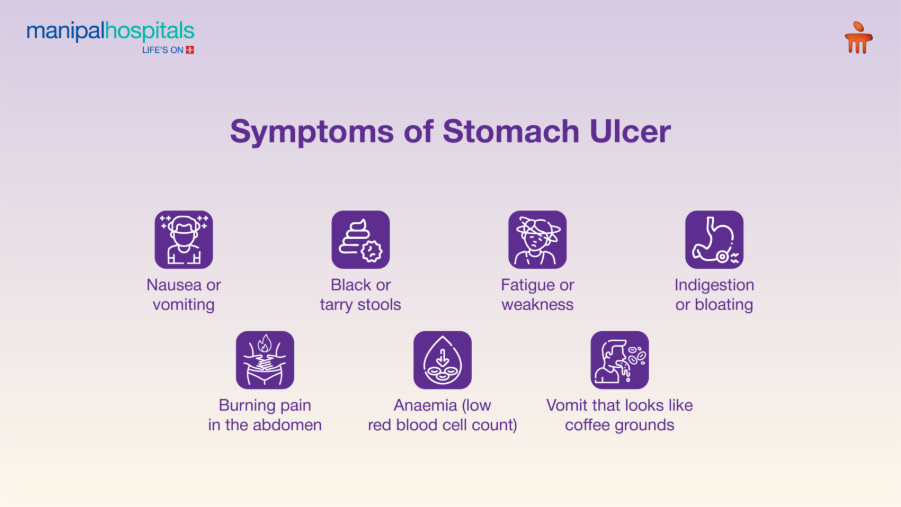
We often face discomfort in the stomach after heavy meals. This is quite common and resolves by itself. But what is not common is burning pain in the stomach after every meal. It may indicate towards more serious issues, like stomach ulcers. Stomach ulcers happen when the protective layer of the stomach gets damaged. It allows acids to enter the inner stomach lining, causing painful sores. Stomach ulcers are treatable, but leaving them untreated for too long can cause severe complications.
Synopsis
What are Stomach Ulcers?
The stomach is protected by a thick layer of mucous that prevents entry of stomach acids. When this protective layer is damaged, the acids can enter the stomach lining and cause painful sores. These sores are called stomach ulcers. Stomach ulcer, also called gastric ulcer, is a type of peptic ulcer. Other types of peptic ulcers are duodenal ulcers and oesophageal ulcers.
Causes of Stomach Ulcers
Some common factors responsible for stomach ulcers are:
-
Bacteria: Stomach ulcers are primarily caused by bacterium H. pylori. It normally lives in the stomach. But when it grows excessively, it eats away at the protective layer of the stomach. This allows acids to enter, causing inflammation and painful sores along the inner stomach lining.
-
Frequent use of non-steroidal anti-inflammatory drugs (NSAID): Frequently using non-steroidal drugs, like pain killers, can cause stomach ulcer. They produce excess stomach acids which break down the protective layer of the stomach, making it vulnerable to ulcers.
-
Medical conditions: Certain medical conditions facilitate excess stomach acid production. Zollinger-Ellison Syndrome (ZES) is a rare endocrine disorder that forms tumours in the pancreas or duodenum. These tumours cause excess acid formation, resulting in chronic ulcers.
-
Lifestyle habits: Certain lifestyle habits are indirectly responsible for causing stomach ulcers. Unmanaged stress, eating heavily spicy foods, smoking and excess caffeine consumption can exacerbate risk of stomach ulcers.
-
Family history: Individuals with a family history of chronic stomach ulcers are at significant risk of this condition.
Stomach Ulcer Symptoms
Stomach ulcers are sores that happen on the inner lining of the stomach due to damage from stomach acids. They can have a variety of symptoms based on their severity. Some symptoms of stomach ulcers are:

-
Burning pain in the stomach, usually right below the breast bone
-
Bloating or feeling full easily
-
Heartburn
Some serious symptoms of stomach ulcer may include bloody vomit resembling coffee grounds, black tarry stools indicating internal bleeding, weakness and anaemia.
Stomach Ulcer Symptoms in Women
Symptoms of stomach ulcer are common in both men and women. However, pregnancy and menstruation in women can indirectly affect stomach ulcers. Indigestion and vomiting are common occurrences in pregnancy. This may worsen stomach ulcers in women already affected by it. On the other hand, stress caused due to managing a chronic condition like stomach ulcer can cause hormonal imbalance, disrupting regularity in menstrual cycle.
Treatment for Stomach Ulcers
Some common treatment procedures for stomach ulcers are:
-
Medication: when stomach ulcers are caused by the bacterium H. pylori, antibiotics like amoxicillin and metronidazole are used for treatment. For ulcers caused due to NSAIDs and excess stomach acid, cytoprotective agents and H2 blockers are used. They coat the stomach lining and control excess stomach acid production.
-
Surgery: stomach ulcers are commonly treated with medication. However, serious complications, like perforated ulcer, persistently bleeding ulcer and ulcers blocking food passage, are resolved with surgery.
Stomach Ulcer Prevention
Stomach ulcers require urgent treatment, but some factors can help in preventing them:
-
Infection control: bacterium H. pylori is usually responsible for this condition. So, preventing infection is necessary. Washing hands before eating and after using the bathroom, drinking filtered water and avoiding food from unhygienic places are key ways in preventing infection.
-
Cautious use of NSAIDs: painkillers and other non-steroidal drugs must be used cautiously and only under the supervision of a doctor.
-
Change in lifestyle habits: no smoking, limited drinking and proper stress management help manage stomach ulcers. Getting quality sleep and eating meals on time are also essential in reducing the risk.
-
Diet: foods rich in fibre, probiotics and essential micronutrients should be included in the diet to aid gut health. Spicy and deep-fried foods must be avoided.
-
Regular health check-up: regular check-up with your doctor is necessary to prevent re-occurrence of stomach ulcers.
Many people might confuse symptoms of stomach ulcer with indigestion. But if you experience persistent burning pain in the stomach, lack of appetite, nausea, vomiting, sudden weight loss or black stools, you must consult a gastroenterologist urgently. Lack of treatment can worsen symtoms and lead to severe complications.
FAQ's
Stomach ulcer can be indirectly contagious when caused by H. pylori. It can transmit through saliva, contaminated food or utensils. Maintaining proper hygiene is necessary to prevent contamination and risk of infection.
Yes. Drinking small sips of water throughout the day helps dilute stomach acid, reduces inflammation and aids digestion, thereby reducing risk of stomach ulcers.
Stomach ulcers may not always cause pain. These are called ‘silent ulcers’. In older adults suffering from diabetes or on pain killers, pain from stomach ulcer is majorly absent. In them, stomach ulcer is diagnosed when signs of bleeding appear.
Ulcer pain is a burning, gnawing pain in the middle of the upper abdomen, right below the breastbone. It usually appears on empty stomach, either late night or early morning. Eating food temporarily reduces the pain.
Normal stomach pain usually moves around the upper abdomen, and happens due to gas or indigestion. It typically appears after a heavy meal, and disappears after some rest or simple remedies.
When bacterial growth increases, it can cause a foul, metallic odour in the mouth. On the other hand, repeated vomiting due to severe ulcer pain erodes at tooth enamel and irritates the throat.






















 7 Min Read
7 Min Read










